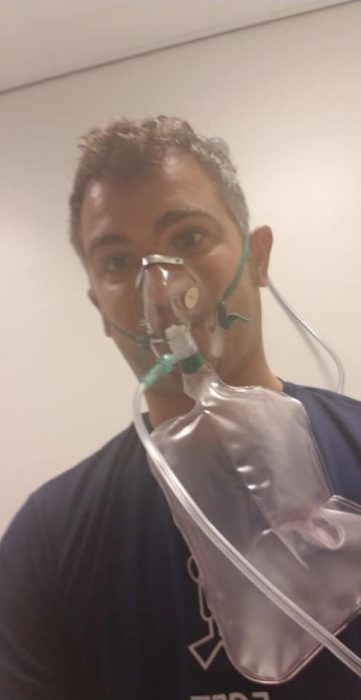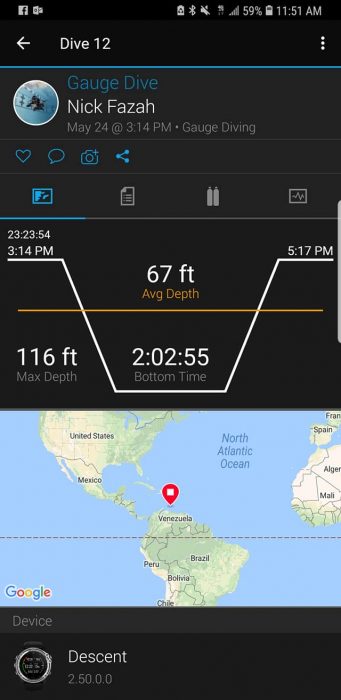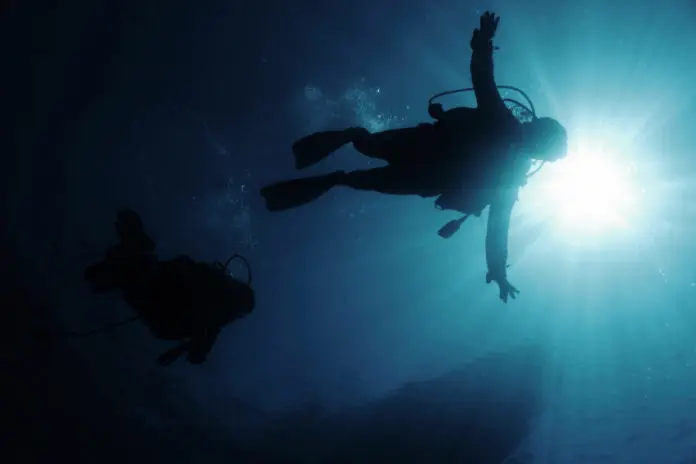On the evening of Thursday, May 24th, 2018, I experienced my first DCS hit. Decompression Sickness (DCS) is seldom talked about and is often considered a taboo subject. The following is my account of my DCS hit, my thoughts and the lessons I learned from my experience.

The Dive
I was diving on my Closed Circuit Rebreather running a high set point of 1.3 for a total runtime of 120 minutes. The max depth was 116ft/35m with the dive average being 67ft/20m. It was a no decompression profile with a little more aggressive gradient factor of 40/85. I’ve always run a 40/60 in the past but had assumed that since the plan was for a fairly shallow profile, I could bump my gradient factor a little higher on the shallow side and be fine. I was wrong.
Although I didn’t breach any safety stops or ascent rates and stayed 10 minutes above my No Decompression Limit for the duration of the dive, I still got hit.

The Symptoms
About 2 hours after the dive my stomach began to feel warm, almost like a sunburn. This struck me as a little unusual since I hadn’t been in the sun much that day. I put the feeling down to irritation from my wetsuit and continued with my evening. About half an hour later I felt my stomach getting itchy which set off some alarm bells, I continued to monitor for changes and within the hour full bruising and mottling of my stomach and lower back had occurred.
I grabbed the O2 bottles from the rebreathers and hooked them up to a regulator and put myself on oxygen for the next 2 hours. Most of the markings subsided during this time, so I drank a bunch of water and put myself to bed.
The next day I took it easy, hyperhydrated and contemplated what could have happened and my next course of action. With our flight home the next day I finally decided it would be prudent to speak with a professional and get checked out. My main concern was the development of a Central Nervous System or Neurological hit on the flight home. The thought of being trapped on a plane for 5 hours with symptoms that would incapacitate me and potentially leave me paralyzed or worse was not something I was willing to risk.
That afternoon I called DAN, and while they said the usual course of treatment for a skin hit is oxygen therapy on the surface, I should still get checked out and get an objective opinion on my actual state. The doctors confirmed a skin Decompression Sickness hit and recommended a couple of courses of action.
- Recompression chamber
- Six additional hours of oxygen therapy.
I chose the latter and the symptoms cleared out. The physicians grounded me from flying for an additional 24 hours and requested I return for a follow up on Saturday afternoon.
The next afternoon I waved goodbye to the rest of my group and headed back for re-evaluation. The follow up went without a hitch, and I was symptom-free other than a little tenderness. With all of the symptoms gone the doctors cleared me to fly home Sunday morning.
Some Conclusions
If I had observed these signs of a Decompression Sickness hit on any of the divers on the trip, I would have made them seek medical attention out immediately, without any argument what so ever. However, since I was judging myself, I let my ego get in the way of seeking help sooner rather than later. In future, I will evaluate myself objectively, as if I was a diver under my supervision, all ego aside.
My thoughts on why I got the hit come down to fatigue and dehydration. I have had a heavy travel schedule this year and took my health for granted. With the amount of teaching I have been doing across multiple diving disciplines and recently changing my lifestyle in the last six weeks to work out and eat healthier, I believe my body was stressed, lacking suitable hydration and exhausted.
If it ain’t broke, don’t fix it. There was no good reason to change my gradient factor, especially to one that was less conservative when I already felt tired. What I had been diving in the past had been working for me and the combination of the above and my curiosity to change things resulted in a consequence I never thought I’d experience.
The Lesson
No matter what the type of diving you’re doing, the state of your mental and physical preparation is of paramount importance. No dive is a little dive and should be treated accordingly. In all sports that test our limits, there are “oh sh*t” moments. These moments serve as a firm reality check when we may be getting a little too lofty in the assumptions of our abilities. While I am pissed off and disappointed for not being better about taking care of myself, I am grateful for the fact that I have been taught this lesson with relatively minimal consequence.
By no means do I consider the hit a light matter and wanted to share with the community my experience in the hope that the information provided will allow others to learn from my mistakes. There is still so much we need to learn about Decompression Sickness. We as divers and dive professionals tend to hide these stories behind closed doors for fear that the stigma attached to DCS may make us look foolish, or that we did something wrong. The truth of the matter is that there are a lot of unreported hits out there. If we continue to let the stigma of DCS keep the information in the shadows, it will be incredibly hard to learn from each other and avoid this situation in the future.

